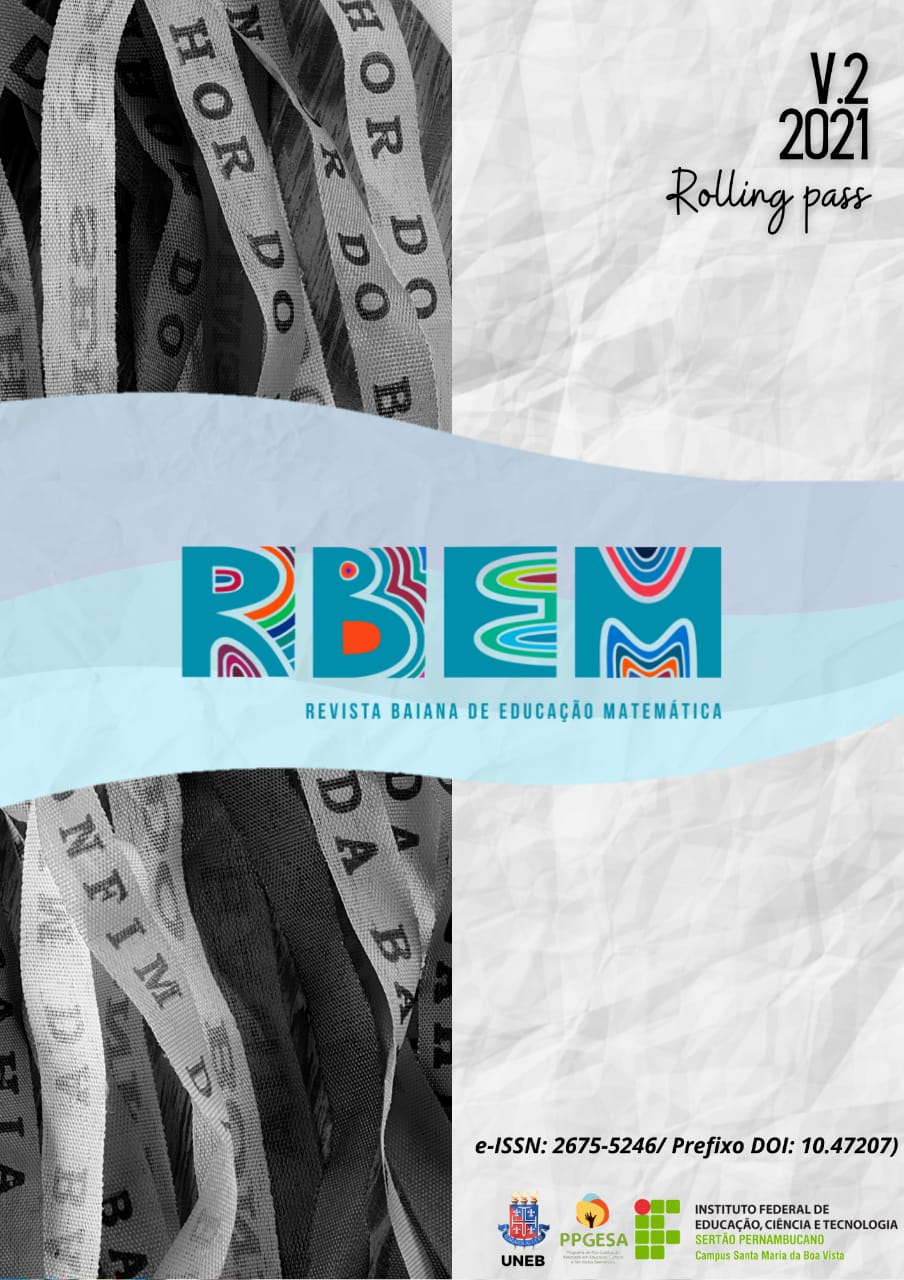The supervised internship contributing to the master student's training process in the teaching internship in times of pandemic
Main Article Content
Abstract
This study is an experience report on the realization of the Teaching Internship/CAPES during a Master's Course in Teaching at the State University of Southwest Bahia-UESB. It was carried out in 2021 in a 5th semester class of the Mathematics degree course. The purpose of the report is to expose reflections when performing a Teaching Internship in a Supervised Internship discipline, in times of pandemic. More specifically: characterize the in-person and virtual Teaching Internship (DE); contrast the Supervised Internship (ES) performed in person with the ES held remotely and register the contributions of the ES in the master's training process while performing the ED, in virtual mode. The participation of the master's student, during the internship, took place through acting in synchronous classes, readings and discussions of texts, activities proposed by the teacher and second author of this report; observation of classes taught by ES students and the opportunity of conducting. Data collection was done through analytical notes and report production by the master. As a result, the teaching internship was an experience of great relevance, as it provided the opportunity to know teaching strategies, sharing knowledge about planning, assessment, problem solving and reflection on teaching practice. Carrying out the ED was fundamental for both the academic and professional training of the first author. Internship (ES) performed in person with the ES held remotely and register the contributions of the ES in the master's training process while performing the ED, in virtual mode. Data collection was done through analytical notes and report production by the master's student at the Internship/CAPES. The experience provided an opportunity to know teaching strategies, knowledge sharing and reflection on teaching practice. As a result, the teaching internship was constituted as an experience of great relevance, as: participation in lives, readings and discussions of texts, classes and activities that were proposed by the teacher; observation of classes taught by ES students in classes where the master teaches and the opportunity to conduct, constituted fundamental activities for both my academic and professional training.
Downloads
Article Details
Uma nova publicação de artigo anteriormente publicado na Revista Baiana de Educação Matemática, fica sujeita à expressa menção da precedência de sua publicação neste periódico, seguindo as normas de referência. Autores que publicam na RBEM concordam com os seguintes termos:
-
O Conselho Editorial se reserva ao direito de efetuar, nos originais, alterações de ordem normativa, sintática, ortográfica e bibliográfica com vistas a manter o padrão culto da língua, respeitando, porém, o estilo dos autores. As provas finais poderão ou não ser enviadas aos autores.
-
Autores mantém os direitos autorais e concedem à revista o direito de primeira publicação, com o trabalho simultaneamente licenciado sob a Licença Creative Commons Attribution (CC BY-NC-SA).
-
Autores têm autorização para assumir contratos adicionais separadamente, para distribuição não-exclusiva da versão do trabalho publicada nesta revista, exemplo: publicar em repositório institucional ou como capítulo de livro, com reconhecimento de autoria e publicação inicial na RBEM.
-
Autores têm permissão e são estimulados a publicar e distribuir seu trabalho online — em repositórios institucionais, página pessoal, rede social ou demais sites de divulgação científica.
References
BRASIL. Coordenação de Aperfeiçoamento de Pessoal de Nível Superior (CAPES). Portaria nº 76, de 14 de abril de 2010. Diário Oficial da União, Brasília, DF, 19 abr. 2010. Seção 1, p. 31-32. Disponível em: <https://www.capes.gov.br/images/stories/download/legislacao/Portaria_076_RegulamentoDS.pdf>. Acesso em 26 de abril de 2021.
CARRER. J. J; DOEREING. L. R; RIPPOL. C.C. A divisão Euclidiana e o resto desde os anos iniciais. 1ª edição. 2018. Rio de Janeiro. Sociedade Brasileira de Matemática- SBEM.
DANTE. Luiz Roberto. Coleção Ápis matemática: ensino fundamental, anos iniciais. 3. ed. São Paulo : Ática, 2017.
FREIRE, Paulo. Carta de Paulo Freire aos Professores – Ensinar e aprender: leitura do mundo, leitura da palavra. Estudos Avançados, n. 15, v. 42, 2001, p. 259-268.
Disponível em: <http://www.scielo.br/scielo.php?script=sci_pdf&pid=S0103-
&lng=en&nrm=iso&tlng=pt>. Acesso em 26 de abril de 2021.
GIOVANNI Castrucci; GIOVANNI Jr. A Conquista da Matemática. 6º ano. Ed. renov. São Paulo/; FTD, 2007- coleção a conquista da matemática.
INÁCIO. A.M; RONQUI. D.D; MANDELLI. J. P; SCHMIDT. K. G. A. do V. estágio Docente em Modalidade Remota: breve relato de experiência em tempos pandêmicos. III SENPE. Seminário Nacional de Pesquisa em Educação. 2020.
LIU, K. et al. Clinical features of COVID-19 in elderly patients: A comparison with young and middle-aged patients. [published online ahead of print,2020 Mar 27].Journal of Infection.2020. Disponível em: https://pubmed.ncbi.nlm.nih.gov/32171866/
ONUCHIC. L. de La. R; ALLEVATO. N. S. G. Pesquisa em Resolução de Problemas: caminhos, avanços e novas perspectivas. Bolema, Rio Claro (SP), v. 25, n. 41, p. 73-98, dez. 2011. disponível em:https://www.periodicos.rc.biblioteca.unesp.br/index.php/bolema/article/view/5739
PONTE, J. P.; BROCARDO, J.; OLIVEIRA, H. Investigações Matemáticas na sala de aula. Belo Horizonte: Autêntica, 2005.
Programa de Pós-graduação em Ensino- PPGEN. Universidade Estadual do Sudoeste da Bahia. 2016. Disponível em: http://www2.uesb.br/ppg/ppgen/. Acesso em: 02 jun.2021.
DOS SANTOS, JOÃO RICARDO VIOLA. O que alunos da escola básica mostram saber por meio de sua produção escrita em matemática. 2007.
SANTOS. J. R.V.D; BURIASCO. R.L.C.D; FERREIRA. P.E.A. Interpretações de Alunos da Educação Básica Para a Idéia de Recorrência em uma Questão Aberta de Matemática. Educ. Matem. Pesq., São Paulo, v.12, n.1, pp.143-163, 2010.Link
SMOLE, Kátia Stocco; DINIZ; Maria Ignez. Ler, Escrever e Resolver Problemas: habilidades básicas para aprender matemática. Cap.2, p. 29-68 Porto Alegre: Artmed, 2001.
TARDIF, Maurice. Saberes docentes e formação profissional. 17 ed. – Petrópolis, RJ: Vozes, 2014.
VAILLANT, D.; MARCELO, C. Ensinando a ensinar: as quatro etapas de uma aprendizagem. Curitiba: UTFPR, 2012.

